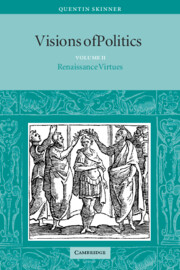Book contents
- Frontmatter
- Contents
- List of plates
- General preface
- Full contents: Volumes 1–3
- Acknowledgements
- Conventions
- 1 Introduction: The reality of the Renaissance
- 2 The rediscovery of republican values
- 3 Ambrogio Lorenzetti and the portrayal of virtuous government
- 4 Ambrogio Lorenzetti on the power and glory of republics
- 5 Republican virtues in an age of princes
- 6 Machiavelli on virtù and the maintenance of liberty
- 7 The idea of negative liberty: Machiavellian and modern perspectives
- 8 Thomas More's Utopia and the virtue of true nobility
- 9 Humanism, scholasticism and popular sovereignty
- 10 Moral ambiguity and the Renaissance art of eloquence
- 11 John Milton and the politics of slavery
- 12 Classical liberty, Renaissance translation and the English civil war
- 13 Augustan party politics and Renaissance constitutional thought
- 14 From the state of princes to the person of the state
- Bibliographies
- Index
- Plate section
10 - Moral ambiguity and the Renaissance art of eloquence
Published online by Cambridge University Press: 05 September 2012
- Frontmatter
- Contents
- List of plates
- General preface
- Full contents: Volumes 1–3
- Acknowledgements
- Conventions
- 1 Introduction: The reality of the Renaissance
- 2 The rediscovery of republican values
- 3 Ambrogio Lorenzetti and the portrayal of virtuous government
- 4 Ambrogio Lorenzetti on the power and glory of republics
- 5 Republican virtues in an age of princes
- 6 Machiavelli on virtù and the maintenance of liberty
- 7 The idea of negative liberty: Machiavellian and modern perspectives
- 8 Thomas More's Utopia and the virtue of true nobility
- 9 Humanism, scholasticism and popular sovereignty
- 10 Moral ambiguity and the Renaissance art of eloquence
- 11 John Milton and the politics of slavery
- 12 Classical liberty, Renaissance translation and the English civil war
- 13 Augustan party politics and Renaissance constitutional thought
- 14 From the state of princes to the person of the state
- Bibliographies
- Index
- Plate section
Summary
If we consider the leading works of English philosophy written in the age of the scientific revolution, we can hardly fail to be struck by the anxiety they frequently register about what John Locke, in his Essay Concerning Human Understanding, calls the ‘doubtfulness and uncertainty’, the ‘great uncertainty and obscurity’ afflicting the application of moral terms. This sense of increasing ambiguity and confusion about the description and appraisal of human actions was, for example, widespread within the early Royal Society. It underlies John Wilkins's plan of 1668 for the construction of what he called a philosophical language, and it surfaces in the History of the society published by Thomas Sprat in the previous year, in which he complains that the use of ambiguous and over-elaborate language has ‘already overwhelm'd most other Arts and Professions’.
A similar disquiet pervades Locke's analysis in Book 3 of the Essay of what he calls ‘the imperfections and abuses’ of words:
Men's Names, of very compound Ideas, such as for the most part are moral Words, have seldom, in two different Men, the same precise signification; since one Man's complex Idea seldom agrees with anothers, and often differs from his own, from that which he had yesterday, or will have tomorrow.
As a result of these confusions, Locke goes on, there is ‘scarce any Name, of any very complex Idea, (to say nothing of others,) which, in common Use, has not a great latitude, and which keeping within the bounds of Propriety, may not be made the sign of far different Ideas’.
- Type
- Chapter
- Information
- Visions of Politics , pp. 264 - 285Publisher: Cambridge University PressPrint publication year: 2002
- 1
- Cited by

